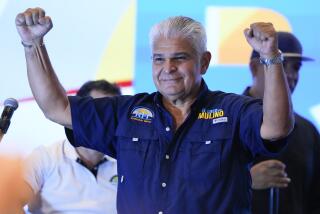12 Miami Jurors Receive Noriega’s Case : Courts: The former Panamanian dictator is charged with conspiracy, racketeering and smuggling while aiding Colombian drug lords.
- Share via
MIAMI — The fate of former Panamanian dictator Manuel A. Noriega, who is charged with 10 counts of conspiracy, racketeering and drug smuggling for allegedly helping Colombian drug lords spirit tons of cocaine into the United States, was put in the hands of a jury of nine women and three men Friday night.
After four days of closing arguments by attorneys for both sides, U.S. District Judge William M. Hoeveler presented the case to jurors with the admonition: “You must judge this case on the indictment alone and not on any concerns of politics or foreign policy.”
Hoeveler also told jurors that they were not to be influenced by the way in which Noriega was brought to trial--flushed out of hiding by the U.S. invasion of Panama in December, 1989.
He said the jury was to judge each of the charges separately, and only convict the deposed dictator if they found him “guilty beyond a reasonable doubt.”
The jurors, who are sequestered in a downtown hotel, plan to deliberate throughout the weekend.
Hoeveler read his instructions to the jury after chief prosecutor Michael P. Sullivan, in a rebuttal statement, disputed claims by defense attorney Frank A. Rubino that the government’s case against Noriega was based mainly on hearsay testimony and the word of convicted drug felons who could not be trusted.
Defense lawyers also have contended that Noriega was indicted by the Ronald Reagan Administration in 1988 because he refused to send Panamanian troops to fight Nicaragua’s Sandinista government, which was opposed at the time by U.S.-backed rebel forces.
“This case has nothing to do with politics,” Sullivan said. “It has everything to do with Manuel Noriega’s ability to facilitate drug trafficking for the Medellin cartel.”
The prosecutor added that among the government’s 51 witnesses, 11 testified about first-hand contacts with Noriega concerning a total of $24 million that he allegedly received in drug payoffs.
Other witnesses gave circumstantial but not direct evidence of such payments. The defense case largely was based on attacks on the credibility of prosecution witnesses, as well as testimony from some former agents and officials of the U.S. Drug Enforcement Administration that Noriega had cooperated in tracking down drug offenders and drug-money couriers.
If convicted on all charges, Noriega faces a maximum penalty of 160 years in prison and fines of more than $1 million. He has remained in federal custody in Miami for 27 months. During the course of his trial, he has spent the last seven months in a cell in the basement of the federal courthouse.
More to Read
Sign up for Essential California
The most important California stories and recommendations in your inbox every morning.
You may occasionally receive promotional content from the Los Angeles Times.













